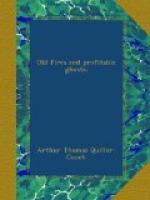“I looked up, and my eyes fell on the retreating back of John Emmet, already half-way towards the Italian garden.”
“‘Queer fellow, that—what’s his name?—John Emmet,’ said I late that night on our return to the inn, as Dick and I mixed our whiskey and prepared for a smoke before his sitting-room fire.
“‘Tile loose, I fancy,’ answered Dick, pausing with a lighted match in his hand. ’I’ve an idea that he owes me a grudge for coming here and carrying off Felicia.’
“‘What gives you that notion?’
“’Well, you see he has always been a favourite of hers. She tells me that the hours she managed to steal and spend in the garden, chatting with John Emmet while he worked, were the happiest in her childhood. He seems to have been a kind of out-of-door protector to her, and I’ll bet she twisted him round her small thumb.’
“‘That’s little enough to go upon,’ was my comment. ’It struck me, on the contrary, that the man eyed you with some affection, not to say pride.’
“’Well, it’s a small thing, but I can’t help remembering how he took the news of Felicia’s—of our engagement. You see, it happened at a fancy-dress dance.’
“‘What happened?’
“’Don’t be dense, Padre. Why, it—the engagement. The dance was given by some people who live two miles from here—people called Bargrave. Felicia and I drove over. She wore an old Court dress of her grandmother’s or great-grand-mother’s: I’m no hand at costumes, and can only tell you that she looked particularly jolly in it. I went in uniform—mess uniform, that is. It’s one of the minor advantages of the service that on these occasions a man hasn’t to put on a cavalier’s wig and look like a goat out for a holiday. Well, as I was saying, at this particular dance it happened. It was daybreak when we started to drive home; a perfect midsummer morning, sun shining, dew on the hedges, and the birds singing fit to split themselves. Felicia and I had a lot to say to each other, naturally; and it occurred to us to stop the carriage at the gates and send it on while we walked up to the house together. We took the path leading through the Italian garden, and there—pretty well in the same place where you saw him this afternoon— we came on John Emmet, already out and at work: or rather he was leaning on a hoe and staring after the carriage as it moved up the avenue behind the limes. We came on him from behind, and, I suppose, suddenly. Anyhow, we scared him. I never saw such a face in my life as he turned on us! It went all white in an instant, and then slowly whiter. No doubt our dress was unusual: but I’m not accustomed to be taken for a ghost—’
“‘Was it you who frightened him?’
“’Yes, I think so. He kept his eyes on me, anyway: and at first, when Felicia asked him to congratulate her, he didn’t seem to hear. After a bit, however, he picked up his speech and muttered something about fate, and wishing her joy—I forget what. Felicia confessed afterwards that his face had fairly frightened her.’




